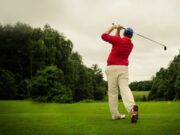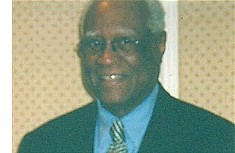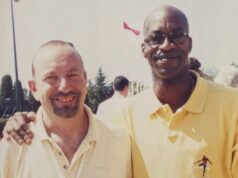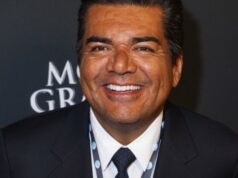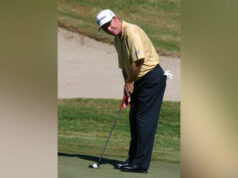With Paul Schienberg, Ph.D.
Herb Douglas is a former 1948 Olympic Bronze medalist and an advocate and practitioner of total mental preparedness. Leveraging his success in world-class athletics, he became one of the highest-ranking African-American business executives in the country at Scheiffelin & Somerset, a subsidiary of the giant Luis Vuitton Moet Hennessey corporation. In 1980, Mr. Douglas founded the International Amateur Athletic Association (IAAA), an organization that presents the prestigious American-International Trophy and American-International Global Awards to the world’s best amateur athletes. Mr. Douglas presently serves as Chairman Emeritus of that organization. We met with him at the Waldorf Astoria Hotel, in New York City, after a press conference given by the IAAA for their 2002 Sportsman Of The Year, Ian Thorpe of Australia.
PSYCHED: I am talking with Herb Douglas about his successful athletic career. Specifically, we will be focusing on how he used his mind to enhance athletic performance. What makes for a successful athlete?
DOUGLAS: What separates the talented successful athlete from the talented unsuccessful athlete is what goes on between the ears – how an athlete evaluates (his) or (her) body. You have to do the four basics components of success: analyze, organize, initiate and follow through. If you do that with yourself, and use the data, you will be successful.
P: What is the benefit of participating in athletics for children and adults?
D: I believe in sports because I was always a part of sports. It developed a confidence in me whereby I could transcend whatever else I did. I could be fair with myself. I could assess myself accurately. I learned a great deal about limits. If I could not handle something, I knew it. Then I would give it to someone else who had the ability to do it.
P: Do you have a moment in your life that might illustrate this point?
D: Oh yes. If you would have told me six months before I got my masters degree that I wasn’t going to be a physical education teacher and a coach, I would have told you, you were crazy. This is what I want(ed) to be – to be a coach. Because of the racial situation, there were no coaches in Pittsburgh in high school. After three years working at Shefflin Summersett, they made me a national spokesperson. I had people who worked for me and I told them if you follow me, you will succeed.
P: When you were an athlete, were there things you did to get through long practices?
D: I always wanted to compete, never felt bored, that was between my ears. When you are running and you see someone behind you or peripherally, you relax and don’t know why. There is non-thinking about it. It just happens. In my day, there were no coaches and no one to tell you how to do it. I lived on a steep hill in Pittsburgh and I ran up and down hills and did gymnastics so I had upper body muscle strength. No one taught me how to train physically or mentally.
P: Was there a pre-event mental routine you taught yourself and would go through before an event?
D: I had a vision that I would come out on top. You have to go all the way through it. You have to look through the whole event and see the end result. I was in the 1948 Olympics. I saw myself on the stand winning a medal. But, I didn’t have the vision that I would be on the top stand. There are placers and there are winners. I saw myself as a placer. I see competitors who are in the lead in a race and if someone comes up on their side, they give up. These are not winners. There are placers and winners. I knew I was going to be a placer. If I had the right coach, I don’t believe anyone in the world could have beaten me. I ran the 100 and the long jump.
P: What was going on in the blocks before the race begins? What were you thinking?
D: That’s always intense. The tighter the race would be, the more some runners would lean backwards as they ran. Others would lean forward. That was between the ears.
P: Were there particular competitors that inspired you?
D: I won three national titles in long jump and four ICAAAA championships in the long jump. In running, I would always place. Never win. I didn’t have a vision of me winning. To make the Olympic team, I had to be first, second or third in the AAU, first second or third in college division, first second or third in the Army. I knew I was going to get to the final. When I got to the final no one could talk to me, I had to focus. What am I going to do? Again, I only saw me placing. So, that’s what I did. Same thing happened at the Olympics.
P: Was there any differences in the way you approached qualification races?
D: As you get to the semi-finals and finals, the competition gets more severe. The first two races you are more relaxed.
P: Did you put out more or less energy in the races to pace yourself through the rounds of competition?
D: No. The same energy is put out in each race. But, when you are more relaxed, athletes find themselves surprisingly setting world record times. As you tighten up in the later races, there is a tendency to have a poorer performance. It is important to remember the state of mind you were in when you ran so well and try to duplicate it. It is important to enter that relaxed place again. It is hard to measure how well you did after a long jump. But when I heard the crowd go “wow”, I knew I must have done really well.
P: You mentioned relaxing as being really important. Did you have particular ways in which you relaxed yourself?
D: Keep your form. Try to get into a rhythm. And keep on going.
P: Did you ever use breathing exercises to relax?
D: Not really. Just took deep breaths.
P: How about relay races? How did that effect your mental approach?
D: In the 4×200 race, I led off with a 20.6 seconds run. The world record was 20.7 seconds. I was trying to get this thing in my hand to the next runner in the staggered lane. There was teammanship. I knew the guys really well. I respected all the guys. I always thought that I could beat my competition.
P: Did feelings ever effect your performance?
D: One day I was angry at this one guy. I wouldn’t pass the baton on to the next guy who I was running with. I never ran so fast.
P: Tell me about the four basic components of success.
D: Be analytical about your body. If I am not built big and strong for a shot putter, I am built big and strong for something else. The next step is to organize yourself to approach the goal. You have to put all the pieces in place and organize your next step. The third step is to initiate – practice your skills ‘til its part of you. The final step is to follow through on all your efforts.
P: Children are so impatient. Is it important for them to learn these steps?
D: Oh yeah. They don’t do their homework. They just want to put it out there without any of the steps.




